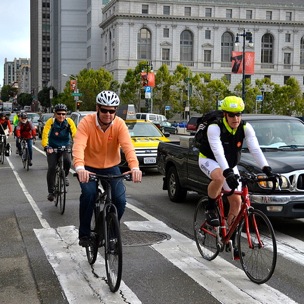July 25, 2014 — For many, sitting alone in a vehicle in a traffic jam on the way to work is a fact of life. But are there policies cities could consider to encourage commuters to ditch the automobile for a bike, improving public health and reducing the environmental toll of motorized transportation?
That was what researchers in New Zealand attempted to answer in a new study, “The Societal Costs and Benefits of Commuter Bicycling: Simulating the Effects of Specific Policies Using System Dynamics Modeling.” The study explored different policy options to encourage commuter bicycling in Auckland, a high-income, car-dependent city.
The verdict? Investing in bike infrastructure pays off. Using a simulation model, the authors determined that policy options such as creating separate bike paths and reduced-speed, bike-friendly streets can yield benefits 10 to 25 times greater than the cost.
“To our knowledge, this is the first integrated simulation model of future specific bicycling policies,” the authors write. “Our projections provide practical evidence that may be used by health and transport policy makers to optimize the benefits of transport bicycling while minimizing negative consequences in a cost-effective manner.” Photo by sfbike (Creative Commons | Flickr)
Ensia shares solutions-focused stories free of charge through our online magazine and partner media. That means audiences around the world have ready access to stories that can — and do — help them shape a better future. If you value our work, please show your support today.
Yes, I'll support Ensia!
